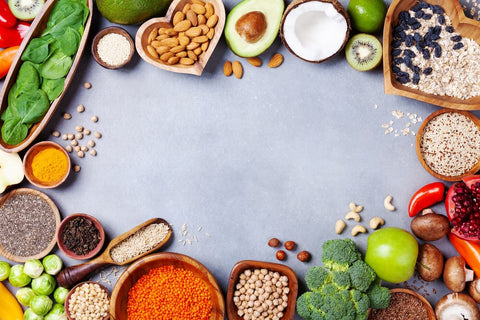As we age, maintaining health becomes increasingly centered around holistic practices integrating balanced nutrition, physical activity, and mental wellness. This guide delves into the dietary adjustments necessary for seniors, highlighting the role of VORG All-in-One Supershake in enhancing longevity and vitality.
Nutritional Priorities for Aging Adults
Bone Health and Chronic Disease Prevention
Aging increases the risk of chronic conditions such as osteoporosis and heart disease. Calcium and vitamin D are essential for maintaining bone density, while omega-3 fatty acids and soluble fiber can help manage cholesterol levels and support heart health.
Cognitive Function and Dietary Influence
Maintaining cognitive function is critical as we age. Nutrients such as antioxidants from berries, leafy greens, and omega-3 fatty acids from nuts and seeds are vital in supporting brain health and reducing the risk of cognitive decline.
Mental Health and Nutrition
Nutrition significantly affects mental health, with B vitamins, omega-3 fatty acids, and antioxidants playing crucial roles in mood regulation and stress reduction. Ensuring a diet rich in these nutrients can help enhance cognitive function and overall mental well-being.
Enhancing Overall Well-being Through Sleep and Physical Activity
Good nutrition is best complemented by adequate sleep and regular physical activity, both of which are pivotal for aging adults:
-
Importance of Sleep: Quality sleep is crucial for cognitive health, emotional balance, and physical health. It aids in the repair of the heart and blood vessels and helps balance the hormones that make you feel hungry or full. Seniors should aim for 7-8 hours of quality sleep per night, adhering to a regular sleep schedule and creating a restful environment.
-
Benefits of Regular Physical Activity: Regular exercise helps aging adults maintain muscle mass, manage weight, reduce the impact of illness and chronic diseases, enhance mobility, decrease the risk of falls, and improve heart health. Activities such as walking, swimming, and tai chi are particularly beneficial as they are low impact yet effective at keeping the body active and agile.
-
Integration of Activities: Incorporating physical activities into daily routines can be as simple as taking short walks, doing stretches, or participating in group exercise classes designed for seniors. These activities not only improve physical health but also provide social interaction and mental stimulation.
Social Aspects of Eating
Social interactions during meals are vital for seniors, as sharing meals can boost appetite, improve food enjoyment, and alleviate feelings of loneliness or depression. Encouraging communal eating settings or family meals can be significantly beneficial.
Technology and Nutrition Tracking
Technology can be a valuable tool for seniors to track their nutrition, manage dietary habits, and order healthy foods online. Using apps and services for nutrition tracking can support seniors in maintaining an independent and healthy lifestyle while staying connected with modern dietary management tools.
Preventive Nutrition
Nutrition protects against age-related diseases like Alzheimer's and Parkinson's. Incorporating specific nutrients known for their protective properties—such as flavonoids, antioxidants, and omega-3 fatty acids—can help mitigate the risk of these conditions.
Dietary Adaptations for Aging Adults
Balanced Meal Planning
For seniors, creating meals that are nutritious and appealing is crucial. Planning should incorporate a variety of colors and textures to enhance meal enjoyment and ensure a range of nutrients.
Overcoming Common Nutritional Challenges
Seniors often face challenges such as reduced appetite or difficulties in chewing and swallowing. Enhancing flavors with herbs and spices, and utilizing supplements like VORG All-in-One Supershake, can ensure nutritional needs are met without large food volumes.
Hydration and Physical Health
Proper hydration is essential yet often overlooked. Seniors should focus on including fluids throughout the day through meals and snacks that incorporate high water content foods.
VORG All-in-One Supershake: Enhancing Senior Nutrition
VORG All-in-One Supershake is designed to meet the unique nutritional needs of seniors, combining high-quality vegan protein with essential vitamins and minerals to manage dietary gaps and support overall health.
Conclusion: A Roadmap to Healthy Aging
With proactive dietary strategies and the right nutritional support like VORG All-in-One Supershake, seniors can enjoy a vibrant, active lifestyle well into their later years. This holistic approach to diet and lifestyle is the key to thriving during the golden years.
FAQs: Tailoring Diets for Senior Health
What is the best nutrition for elderly people?
Nutrition for the elderly should focus on dense nutrient intake with lower calories. Foods rich in vitamins D and B12, calcium, iron, and fiber are crucial. Diets should be tailored to reduce sodium and sugar intake to prevent or manage chronic illnesses like hypertension and diabetes.
What are nutritional recommendations for aging well?
Aging well nutritionally involves eating a variety of whole foods, staying hydrated, and ensuring adequate fiber intake. Antioxidant-rich foods like berries, nuts, and green vegetables are recommended to combat inflammation and support cellular health.
What are five foods that seniors should eat?
Ideal foods for seniors include fatty fish like salmon for omega-3 fatty acids; blueberries for antioxidants; nuts for healthy fats and proteins; spinach for its high vitamin and mineral content; and whole grains for fiber and carbohydrates.
What diet helps with aging?
A Mediterranean diet is often recommended for aging healthily, due to its emphasis on fruits, vegetables, whole grains, olive oil, and lean protein sources, particularly fish. This diet supports heart health and helps maintain cognitive function.
What is the 80/20 rule of nutrition for optimal aging?
The 80/20 rule for optimal aging suggests eating whole, nutrient-rich foods 80% of the time, while allowing for more flexible, indulgent choices 20% of the time. This balance helps maintain strict nutritional habits without feeling restricted, encouraging a sustainable approach to healthy eating.
What foods give energy to the elderly?
Energy-boosting foods for the elderly include complex carbohydrates like oatmeal, high-protein foods like eggs, and fruits like apples and bananas that provide quick, natural sugars and fiber.


